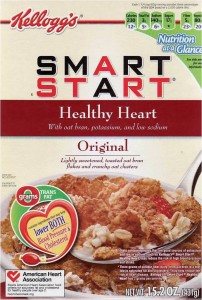Connecticut takes on Smart Choices!
Richard Blumenthal, the Connecticut Attorney General, says he is about to conduct an investigation into the Smart Choices program because it is “overly simplistic, inaccurate and ultimately misleading.” Recall that Froot Loops, a product with sugar as its first ingredient, qualifies as a better-for-you option. Apparently, Mr. Blumenthal is talking to the Attorneys General of other states and several want to join his investigation. While they are at it, maybe they should also take a look at the role of the American Society of Nutrition in developing and managing this program.
But count on the American Council on Science and Health (ACSH) to defend Froot Loops as a Smart Choice. Explains ACSH’s Jeff Stier:
Froot Loops and Lucky Charms have the ‘Smart Choices’ label. They have sugar in them, but they also contain half of a person’s daily requirement of some vitamins. If we’re able to give kids those nutrients, it should be okay to give them some sugar. If they sold these products without sugar, kids wouldn’t eat them, or they might end up adding even more on their own….Don’t companies have the right to say those foods are better than others? It’s not as if they are making specific health claims, rather these are just comparative claims.
This Richard Blumenthal is the same one who has been seeking to ban e-cigarettes…Connecticut may have more serious problems to focus on than banning e-cigarettes and worrying about companies trying to point consumers to healthier products. Froot Loops obviously isn’t the healthiest food out there, but it’s better than many others.
It’s that debatable philosophic argument again: Is a so-called “better-for-you” product necessarily a good choice?
[Note: I’m in Rome this week and am most grateful to the six people who sent me the Times article and the two who sent the ACSH post. Thanks so much!]


